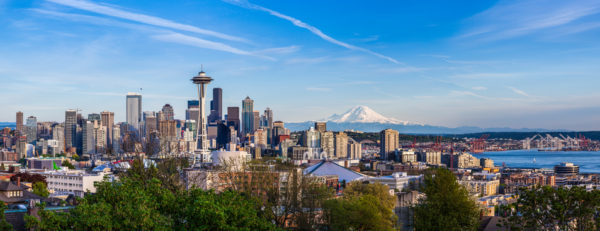Can Seattle’s silo-busting keep it from becoming a “dumb” smart city?
Can Seattle’s silo-busting keep it from becoming a “dumb” smart city?

Though many cities are rushing to launch smart city projects willy nilly, Seattle is taking a deeper look at how to implement new technology that doesn’t build more dumb silos.
Seattle is making a concerted effort to put new connected technology in place that is properly integrated horizontally instead of it building vertical silos.
See also: Mid-sized cities lead the smart city charge
For example, dumb smart city project could include multiple weather sensors installed on municipal utility poles that send information to multiple data centers. This creates the dumb smart city situation where the left device not knowing what the right device is doing.
“That’s what we want to avoid,” said Michael Mattmiller, Seattle’s Chief Technology Officer. “That is a dumb smart city.”
This attitude has led to a silo-busting crusade that Mattmiller has led since taking on his current role in 2014.
“We consolidated technology professionals last year into one department. We had 15 departments that were all trying to figure out technological solutions for themselves and focus on what was tried without thinking of these broader solutions,” he said. “In the past year, we’ve driven awareness about the need to eliminate silos and we’ve worked with all of our departments.”
Still full speed ahead despite the change?
The technology reorganization hasn’t stopped Seattle barrelling ahead with new smart city initiatives like the ShotSpotter’s gunshot detection pilot. This project aims to help police officers determine from which locale gunshots were fired.
As well, the city connecting 800 body video cameras for police officers in early 2017.
The city is also involved in various partnerships with the University of Washington such as the RainWatch smart city initiative.
In a city known for its high levels of annual rainfall, the RainWatch project monitors precipitation in real time so the city can send out flood-related safety warnings.
As well, the city has partnered on an adaptive transportation management system that enables traffic lights to adapt to road and weather conditions.
Seattle’s commitment to smart cities jives with recent research that found that mid-sized U.S. cities were filling the pipeline with more urban technology projects than the largest cities.
The research found that of the 335 smart city projects currently underway, 168 are in mid-sized cities, 98 in small cities and only 69 are ongoing in large cities.
The post Can Seattle’s silo-busting keep it from becoming a “dumb” smart city? appeared first on ReadWrite.
(26)



